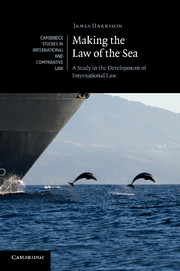Book contents
- Frontmatter
- Contents
- Acknowledgements
- Table of treaties
- Table of cases
- Abbreviations
- 1 Making the modern law of the sea: challenges and opportunities
- 2 The United Nations Convention on the Law of the Sea
- 3 Amendment and modification of the Law of the Sea Convention by the States Parties
- 4 Implementing agreements
- 5 Developments in the deep seabed mining regime
- 6 The International Maritime Organization and the international regulation of shipping
- 7 The contribution of the Food and Agriculture Organization to international fisheries law
- 8 Cooperation, coordination and conflict between international institutions
- 9 Conclusion
- Bibliography
- Index
- CAMBRIDGE STUDIES IN INTERNATIONAL AND COMPARATIVE LAW
7 - The contribution of the Food and Agriculture Organization to international fisheries law
Published online by Cambridge University Press: 03 May 2011
- Frontmatter
- Contents
- Acknowledgements
- Table of treaties
- Table of cases
- Abbreviations
- 1 Making the modern law of the sea: challenges and opportunities
- 2 The United Nations Convention on the Law of the Sea
- 3 Amendment and modification of the Law of the Sea Convention by the States Parties
- 4 Implementing agreements
- 5 Developments in the deep seabed mining regime
- 6 The International Maritime Organization and the international regulation of shipping
- 7 The contribution of the Food and Agriculture Organization to international fisheries law
- 8 Cooperation, coordination and conflict between international institutions
- 9 Conclusion
- Bibliography
- Index
- CAMBRIDGE STUDIES IN INTERNATIONAL AND COMPARATIVE LAW
Summary
Introduction
Fishing has traditionally been one of the most important uses of the oceans and is an important source of food for many communities. In 2008 81.9 million tonnes of fish were landed from vessels fishing at sea. Unsurprisingly, many states have a keen interest in fishing and fishing rights have been at the root of several major international disputes concerning the law of the sea in the past.
The regulation of fisheries is only dealt with in the general terms by the Law of the Sea Convention. The approach of the Convention on this topic is “primarily based upon the nationality orientated approach.” Under the Convention it is for flag states and coastal states to take measures relating to fisheries falling under their jurisdiction. At the same time, the Convention stresses that, wherever fish stocks are located, states should cooperate as may be necessary for their management and conservation. Cooperation is also central to the Fish Stocks Agreement that was adopted in 1995 in order to strengthen the regulatory framework applicable to highly migratory and straddling fish stocks.
There is no single international institution with responsibility for the development of international fisheries law. Much cooperation takes place at the regional or sub-regional level through regional fisheries bodies that are responsible for setting quotas, gear regulations and other specific fisheries measures.
- Type
- Chapter
- Information
- Making the Law of the SeaA Study in the Development of International Law, pp. 200 - 236Publisher: Cambridge University PressPrint publication year: 2011



